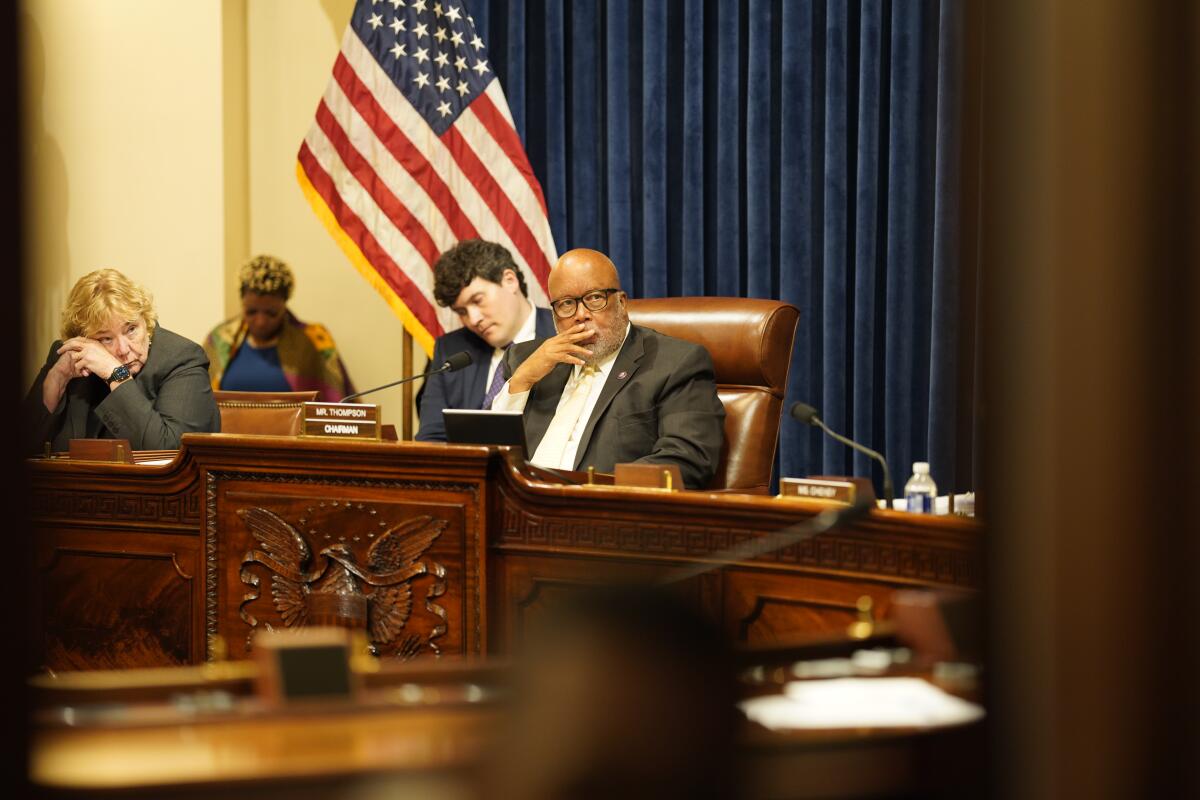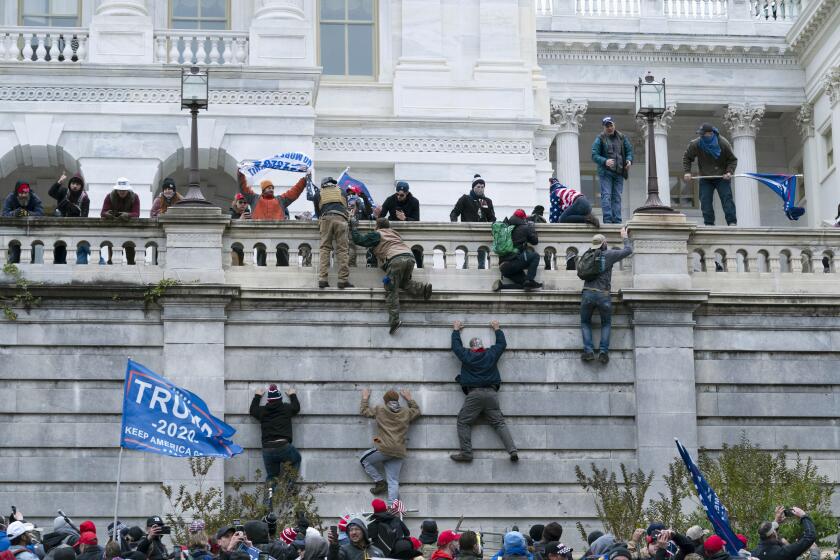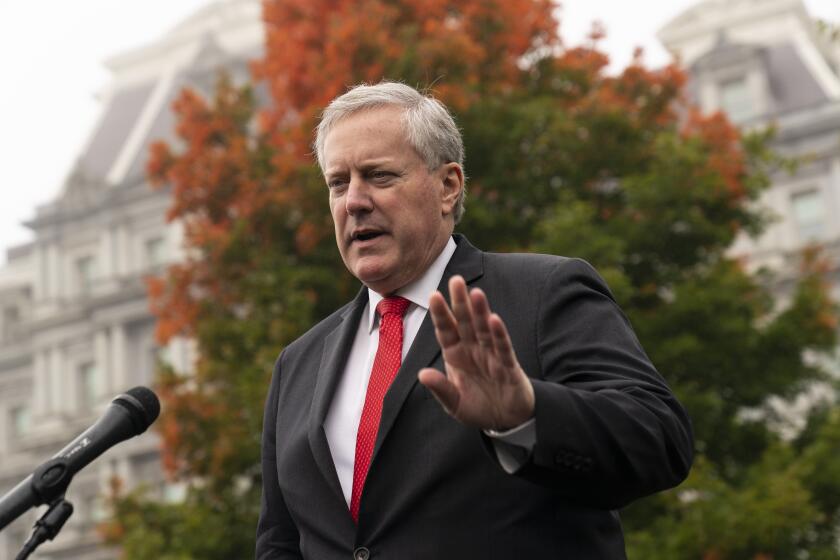What to expect from the next set of Jan. 6 committee hearings

WASHINGTON â The House Jan. 6 committee has so far presented a detailed narrative, including several bombshells, of efforts by former President Trump and his allies to overturn the 2020 election. But an influx of new witnesses and evidence shows there is a lot left for the panel to say when televised hearings resume in September.
The monthlong break will give the committee time to process the new information and draw connections between evidence uncovered in the more than 1,000 depositions and tens of thousands of documents it has collected in a nearly yearlong investigation. Ongoing legal actions indicate the committee isnât giving up on getting more testimony and records from former White House employees, those who advised Trump and some of the people involved in the riot, as the panel rushes to complete its work before the end of the year.
âThe one thing we can be certain [of] is that the committee knows more than we do.... You have that sense that we are seeing only a small portion of sort of the proverbial tip of the iceberg,â said Lara Brown, director of the George Washington University Graduate School of Political Management.
Committee members say the eight hearings so far led new witnesses to come forward with documents, video and information that need to be examined before proceedings continue in September.
Vice Chair Liz Cheney (R-Wyo.) told CNNâs Jake Tapper on âState of the Unionâ Sunday that the committee has scheduled several interviews and plans to speak to several other Trump Cabinet officials. She also said the committee may subpoena conservative activist Virginia âGinniâ Thomas, wife of Supreme Court Justice Clarence Thomas, who connected Trump and his staff with major players in the effort to overturn the vote.
Meanwhile, the committee is still fighting at least two dozen cases in federal court over access to testimony or phone records. The most prominent of those cases, that of former Trump advisor Stephen K. Bannon, who refused to comply with a subpoena to appear before the panel or produce documents, ended with his conviction for contempt of Congress on Friday.
âThat conviction sends a chill down the spine of the non-cooperators,â Norman Eisen, who was special counsel to the House Judiciary Committee during the first impeachment and Senate trial of Trump, said in an interview.
The biggest fish still left for the committee to hook is former White House Chief of Staff Mark Meadows, who after initially handing over some text messages and documents to the committee refused to cooperate further or give a deposition, claiming Trump had asserted executive privilege. The House held him in contempt of Congress, but the Justice Department has decided not to pursue charges.
Still, Meadows is challenging in court the validity of the committeeâs subpoenas for his documents, testimony and phone records. A federal judge is considering whether a former president can assert privilege over a former aide.
The committee investigating the insurrection will focus on what Trump was doing on Jan. 6, 2021. This is the story of what happened without him.
Though itâs unclear how many additional hearings the committee will hold and what topics it will cover, there are myriad unanswered questions to address ahead of the panel releasing its final report.
As the hearing on Thursday closed, Cheney teased where the committee might be headed next, playing audio of Bannon from Oct. 31, 2020, obtained by Mother Jones in which he tells an unidentified group of people that Trump planned to say he won the election, regardless of the outcome.
âWhat Trumpâs gonna do is just declare victory. Right? Heâs gonna declare victory. But that doesnât mean heâs a winner,â Bannon told the group. âHeâs just gonna say heâs a winner.â
Benjamin Teitelbaum, a researcher of the far right who has written a book on Bannon, said the committee has interviewed him about Trumpâs former advisor.
âWhatâs interesting is what light Bannon can shed on the question of there being a deliberate plan to subvert the results of the election and the extent to which that there was a thought-out deliberate scheme on [Trump and his alliesâ] part to claim victory, deny any other vote tally, claim victory early, so that it would cast doubt on any media narrative, that the narrative would change back and forth, and become somewhat obscure, opaque to average Americans and thereby leave some room for doubt,â he said.
In the days leading to Jan. 6, Bannon spoke with a team of high-profile Trump allies who camped out in a suite at the upscale Willard Hotel near the White House, advising the group on plans to convince Vice President Mike Pence and Republican members of Congress to reject votes from certain states in an effort to give Trump a majority of electoral college votes and keep him in office.
Committee members want to know âwhat additional evidence was there that they knew what they were doing and that the riot on [Jan. 6] was part of something bigger,â Teitelbaum said of the back-channel discussions.
Internal Justice Department communications show then-White House Chief of Staff Mark Meadows texted about fraud allegations to the attorney general multiple times within 10 days of the election.
The panel has subpoenaed several people who may have answers to that question. It is seeking phone records from conservative lawyer and activist Cleta Mitchell, who challenged the Georgia election results, and MyPillow Chief Executive and Trump ally Mike Lindell, along with testimony and records from attorney Kurt Olsen, who pushed the Justice Department to challenge the election results before the Supreme Court. Olsen and Mitchell each spoke to Trump on Jan. 6, according to White House call logs.
Duke University history and public policy professor Nancy MacLean said she expects the committee to provide more information on the role of lawmakers in crafting plans to send the election results back to some states so that legislatures could change the results in Trumpâs favor.
âThose members of Congress who asked for pardons in the wake of the storming of the Capitol were all but telling us that they understood that they did something criminal,â she said. trimWith the midterm elections in a few weeks, âI would like to understand the complicity of elected officials with promoting the âBig Lie.ââ
The panel is also likely to further explore the ties between extremist groups that orchestrated the violence and people in Trumpâs orbit such as Roger Stone and former national security advisor Michael Flynn, along with what those inside the White House, including Meadows, might have known in advance.
Meadowsâ aide Cassidy Hutchinson told the committee at its June 28 hearing that Trump instructed Meadows to contact Flynn and Stone the night before the Capitol insurrection on Jan. 6, 2021. Hutchinson said she had to talk Meadows out of going to the Willard Hotel, where Flynn and Stone were staying along with others who had worked to overturn the election results. He called them instead.
Committee staff initially said the July 12 hearing would focus on the relationship between extremist groups and people in Trumpâs orbit, and whether it extended to the White House. Though the committee described in detail how extremists mobilized in response to Trumpâs tweets urging them to come to Washington on Jan. 6, it skimmed their connections with key Trump-world figures.
It remains unclear how much those with direct contact with the president might have known about the plans for violence on Jan. 6.
âThey do seem to be on the trail of the interactions of the extremist groups and Roger Stoneâ and others in Trumpâs orbit, MacLean said of the committee. âI have a sense they will come back to that.â
The resolution of some of the pending court cases could help shed light on the connections.
Stone sued to block a subpoena from the committee for his phone records, as did Susanne Gionet, the mother of neo-Nazi media personality Anthime Gionet, also known as âBaked Alaskaâ; photojournalist Amy Harris, who documented the Proud Boys on Jan. 6; and Oath Keepers leaders Kelly and Connie Meggs, who have been charged by the Justice Department with seditious conspiracy.
The committee initially appeared focused on unearthing more on far-right figures such as Alex Jones and the network of top Trump campaign donors who organized and paid for the rally at the Ellipse near the White House.
But many of the people involved in organizing and fundraising for the rallies on Jan. 6 who were subpoenaed in the early days of the committeeâs investigation have yet to make an appearance in the hearings, either in person or in video depositions.
Brown said that could mean that the committee pivoted to focus more on Trump as it learned more about his role on Jan. 6. The panel is also expected to include information in its final report that is not presented in the public hearings.
âThey might have realized that the deeper they got into this they had bigger fish to fry ... that this wasnât simply, you know, an activist kind of fever dream, that this was, in fact, a directed and coordinated effort that was planned at the highest levels,â she said.
Though the committee has presented evidence that the violence on Jan. 6 was planned and discussed online by extremist groups, it has yet to publicly examine how the nationâs security apparatus failed to anticipate a coordinated strike on the Capitol.
The resolution passed by the House to create the select committee to investigate Jan. 6 specifically tasked the panel with answering that question and making recommendations to prevent such violence in the future.
The committee is also expected to scrutinize how Secret Service text messages from Jan. 5 and Jan. 6, 2021, were deleted after congressional committees instructed the agency to retain all records that might be relevant to the attack. The Department of Homeland Securityâs inspector general has launched a criminal investigation into the destruction of those communications.
Early in the investigation, the committee instructed eight federal agencies to preserve and hand over records, but with so much of its work taking place behind closed doors, it is difficult to tell what information the panel has actually received.
Committee members could also provide greater detail in future hearings on the threats posed to elections. Over the last several weeks, the panel has punctuated its case against the president and his allies with warnings that misinformation about fraud is again being wielded by groups seeking to undermine the publicâs confidence in the system.
âThe No. 1 thing that I want to learn more about is the current threat and how thatâs informed by everything that [the panel] learned about the planning of the conspiracy, the participants in the conspiracy, the funding of the conspiracy and how that has carried forward,â Eisen said. âIt only bubbled back down after the eruption of Jan. 6, but the underlying explosive force, the lava in the volcano of the âBig Lieâ campaign, is still there and the pressure is building again.â
The Justice Department is pursuing criminal charges against hundreds of rioters and is determining whether charges are possible for those who sought the delay or rejection of vote counts in some states. On Tuesday, the Washington Post reported that the Justice Department is also looking into Trumpâs actions as part of its investigation. Some have criticized the agency as moving too slowly and raised concerns it could be preempted by Trumpâs expected announcement that he plans to run for president in 2024.
Atty. Gen. Merrick Garland has cautioned the public not to assume too much about the investigation, and dismissed the idea that charges would be delayed or abandoned if they were merited.
âNo person is above the law in this country. There is nothing in the principles of prosecution ... which prevent us from investigating anyone who is criminally responsible for an attempt to undo a democratic election,â Garland told reporters last week.
Committee Chair Bennie Thompson (D-Miss.) has repeatedly said that the panelâs investigation is ongoing and that members will continue working as long as they can. But the committeeâs timeline depends upon which party takes control of the House after the 2022 midterms. Republicans have said they will stop the investigation.
âTheyâre going to go as far as they can and squeeze every last minute of the year out,â Eisen said.
More to Read
Get the L.A. Times Politics newsletter
Deeply reported insights into legislation, politics and policy from Sacramento, Washington and beyond. In your inbox three times per week.
You may occasionally receive promotional content from the Los Angeles Times.













